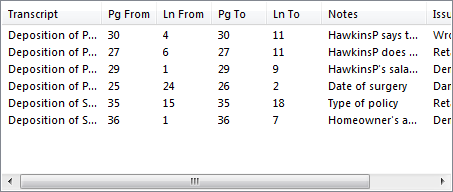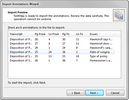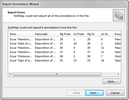Importing annotations
The Import Annotations Wizard allows you to import annotations from a comma delimited text file (.csv) file saved from a Microsoft® Excel spreadsheet without having to do it manually. The Import Annotations Wizard can import multiple annotations into multiple, existing transcripts. The wizard imports page/line number and note designations, and allows the ability to link issues to imported annotations so they can be tagged.
In order to successfully import annotations, the .csv file's columns must be in the following, specified order: Transcript Name, Page From, Line From, Page To, and Line To. The file may also include the Notes and Issues column (optional). This list of issues should be separated by semicolons. The wizard's Welcome page includes a link to view a sample import file (shown below).
|
If you import the same .csv file twice, you will duplicate content in the case. The Import Annotations Wizard will display an Import Errors page if some annotations fail to import. We recommend that you save this information to a file, resolve the errors, and then import the skipped annotations as a separate .csv file. |
|
If an annotation in has "Unknown" listed in the Created By column, it may be an imported annotation. These annotations can be assigned to a case user after the import. See Changing annotation owner status. |
You can also click Import on the File menu, and then click Import Annotations.
First line contains field headers -- The first line of the import file contains the field headers (i.e., Transcript, Pg From, Ln From, etc.) and not the first annotation. Includes Notes field -- Import file includes a field to list the note(s) associated with each annotation. Includes Issues field -- Import file includes a field to list the issue(s) associated with each annotation.
If any annotations cannot be imported (e.g., transcripts with the same name), the wizard displays an Import Errors page listing all annotations that did not successfully import.
The imported annotations now display in the Annotations pane. When you click on an annotation in the Annotations pane, the transcript displays the annotated content with the applicable issue code color, if issues were included were included in the .csv file. |






